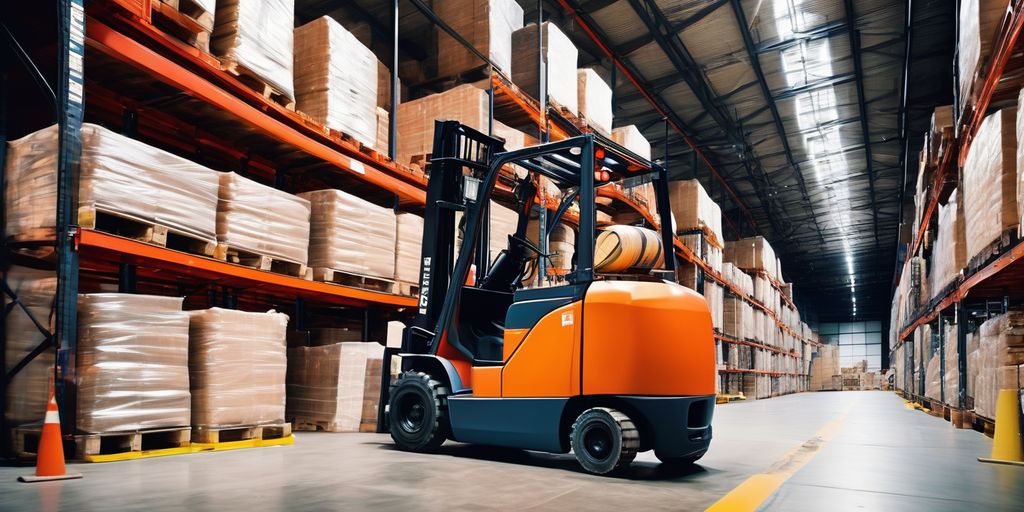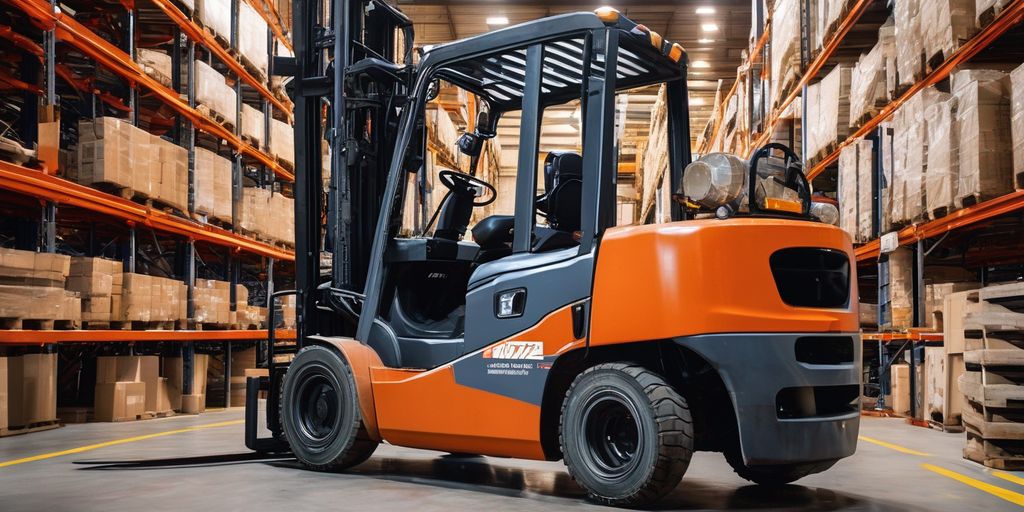Forklift training and certification are essential components of operational safety and efficiency in industries where material handling is prevalent. This requirement, enforced by the Occupational Safety and Health Administration (OSHA), ensures that operators are equipped with the necessary skills to safely and effectively manage forklift operations. Understanding the importance of this training not only helps in compliance with safety standards but also enhances overall productivity and reduces the risk of accidents and associated costs.
Key Takeaways
- Forklift certification is mandated by OSHA to ensure safety and compliance in operations.
- Effective training programs significantly enhance workplace safety and operational efficiency.
- Regular forklift training can lead to a reduction in workplace accidents, injuries, and related costs.
- Advanced training techniques, such as simulators and VR, can improve the learning experience and skill development.
- Choosing the right training provider is crucial for ensuring comprehensive and effective forklift operator training.
Understanding OSHA Requirements for Forklift Certification

Overview of OSHA Standards
OSHA mandates comprehensive training and certification for forklift operators to ensure workplace safety and compliance. Employers are responsible for providing the necessary training to all operators, which includes formal instruction, practical training, and a performance evaluation.
Benefits of Compliance
Adhering to OSHA's forklift certification requirements not only minimizes legal risks but also enhances operational efficiency. Employers who comply can avoid hefty fines, which can exceed $100,000 for willful violations. Moreover, certified operators are generally more proficient and can handle equipment more safely and efficiently.
Navigating Certification Processes
The process to certify forklift operators involves several key steps:
- Formal education or instruction
- Hands-on practical training
- Evaluation of operator performance
Ensuring that all forklift operators are certified is not just a regulatory requirement but a critical investment in workplace safety and productivity.
Benefits of Forklift Training for Safety and Efficiency

Enhancing Workplace Safety
Forklift training is crucial for enhancing workplace safety, ensuring that operators are well-versed in handling the machinery safely. Proper training reduces the likelihood of accidents, which not only protects employees but also minimizes potential disruptions to operations.
Boosting Operational Efficiency
Training programs significantly boost operational efficiency. Operators become more competent and engaged, leading to fewer errors and a more streamlined workflow. This improvement in efficiency can be directly linked to the structured and continuous training that employees receive.
Reducing Costs and Liabilities
Effective forklift training can lead to substantial cost savings by lowering insurance premiums and decreasing maintenance costs. Additionally, compliance with safety standards like OSHA reduces the risk of costly penalties and legal issues, making it a financially wise decision for businesses.
Key Components of Effective Forklift Training Programs

Curriculum and Course Structure
A well-structured curriculum is essential for effective forklift training. It should cover all necessary safety protocols, operational techniques, and maintenance procedures. The course should be divided into modules that progressively build the operator's skills and knowledge. Modules typically include classroom learning, hands-on practice, and evaluation stages.
Practical vs. Theoretical Training
While theoretical knowledge is crucial, practical training ensures that operators can apply what they've learned in real-world scenarios. A balance between practical exercises and classroom instruction optimizes learning outcomes. Training should include simulations of typical workplace scenarios to enhance the operator's readiness and confidence.
Certification and Recertification
Certification is a critical component, confirming that an operator has met all required standards. Recertification ensures ongoing compliance and skill proficiency, which is typically required every three years. The process involves both written and practical assessments to gauge the operator's continued ability to safely and efficiently manage a forklift.
Blockquote: Effective training programs are not just about passing tests but ensuring that forklift operators are continuously updated with the latest safety protocols and operational techniques.
The Role of Forklift Training in Accident Prevention

Statistics on Forklift Accidents
Forklift accidents are a significant concern in industrial and warehouse settings, often leading to severe injuries or fatalities. Accurate data collection and analysis are crucial for understanding the patterns and causes of these accidents, which can inform better training practices.
| Year | Number of Accidents |
|---|---|
| 2019 | 5,500 |
| 2020 | 5,800 |
| 2021 | 5,300 |
How Training Reduces Risks
Effective forklift training programs are essential in reducing the risk of accidents. By focusing on both practical and theoretical aspects, operators become more proficient and aware of potential hazards. Key components of training include:
- Proper operation techniques
- Safety protocols
- Emergency response procedures
Training is not just about compliance; it's about ensuring every operator goes home safe.
Case Studies of Improved Safety
Several organizations have reported significant reductions in forklift-related accidents following the implementation of comprehensive training programs. These case studies highlight the effectiveness of targeted training interventions and the importance of continuous learning and adaptation in safety practices.
Advanced Forklift Training Techniques and Technologies

Latest Training Simulators
Modern forklift training simulators are revolutionizing how operators learn and refine their skills. These simulators provide a risk-free environment where operators can experience a variety of scenarios, including handling loads carefully and navigating through complex warehouse layouts. The immersive experience helps in understanding controls and mastering precise maneuvers without the risk of real-world accidents.
Virtual Reality (VR) Applications
The integration of Virtual Reality (VR) in forklift training offers an immersive learning experience that closely mimics real-life operations. VR applications allow for a deeper engagement with the training material, making it easier for operators to grasp complex concepts and apply them in practical settings. This technology not only enhances learning outcomes but also significantly boosts operational efficiency.
Hands-on Skill Development
Emphasizing hands-on skill development, advanced training programs ensure that operators are not only knowledgeable but also adept at applying what they've learned. Practical training sessions are crucial for operators to gain confidence and competence, which directly contributes to workplace safety and efficiency. These sessions often include daily inspections to ensure a forklift is ready-to-use and safe, reinforcing a proactive approach to forklift management.
Legal Implications of Forklift Training and Certification

Understanding Liability
In the realm of forklift operations, understanding liability is crucial. Employers are responsible for ensuring that all operators are properly trained and certified according to OSHA standards. Failure to do so can result in severe legal consequences, including fines and litigation. Proper documentation of training and certification is essential to demonstrate compliance and mitigate risks.
Regulatory Compliance
Compliance with OSHA regulations is not just a legal obligation but a critical component of workplace safety. The OSHA forklift certification process is designed to mitigate risks associated with forklift operations, reduce the risk of accidents, and protect employees. Regular audits and updates to training programs are necessary to keep pace with regulatory changes and ensure ongoing compliance.
Impact on Insurance and Claims
The presence of a well-documented and compliant forklift training program can significantly impact insurance premiums and claims. Insurance companies often offer better rates to companies that demonstrate high safety standards and legal compliance. In the event of an accident, having a robust training program can be crucial in defending against claims and demonstrating due diligence in safety practices.
How to Choose the Right Forklift Training Provider

Criteria for Selection
Selecting the right forklift training provider is a decision that should not be taken lightly. It is crucial to evaluate the provider's reputation, their compliance with OSHA standards, and the comprehensiveness of their training programs. Consider factors such as the duration of training, the expertise of the trainers, and the feedback from previous clients.
Comparing Training Packages
When comparing training packages, look for transparency in pricing and what each package includes. It's important to understand what you're paying for and to ensure that the training covers all necessary aspects of forklift operation and safety. A table can be useful to compare the features of different training packages at a glance.
| Feature | Package A | Package B | Package C |
|---|---|---|---|
| Duration | 2 days | 3 days | 1 day |
| Price | $300 | $450 | $250 |
| Certification | Yes | Yes | No |
Evaluating Trainer Credentials
The credentials of the trainers are vital in ensuring effective training. Look for trainers who have extensive experience and are certified under relevant authorities. It's also beneficial to check if the training provider offers continuous learning and support even after the initial training period is over.
Ensuring that your forklift operators are well-trained can significantly reduce workplace accidents and increase operational efficiency.
Conclusion
In conclusion, the importance of forklift training and certification cannot be overstated. Proper training ensures that operators are equipped with the necessary skills to handle forklifts safely and efficiently, thereby reducing the risk of accidents and enhancing productivity in the workplace. Certification not only complies with OSHA regulations but also instills a culture of safety and responsibility among employees. Investing in comprehensive forklift training programs is essential for any business that aims to optimize operations and maintain a safe working environment. As we have explored throughout this article, the benefits of such an investment are clear and compelling, making it a crucial aspect of operational success.
Frequently Asked Questions
What are the OSHA requirements for forklift certification?
OSHA requires that all forklift operators must be trained and certified to ensure they can operate lift trucks safely and comply with safety regulations.
How does forklift training enhance workplace safety?
Forklift training teaches operators how to handle the equipment safely, reducing the risk of accidents and injuries in the workplace.
What are the benefits of continuous forklift training?
Continuous training helps maintain high safety standards, improves operational efficiency, and keeps operators updated on the latest safety protocols and techniques.
What should a forklift training program include?
A comprehensive forklift training program should include both theoretical and practical training components, covering safety regulations, operational techniques, and hands-on practice.
How often should forklift certification be renewed?
Forklift certification typically needs to be renewed every three years, but this can vary depending on company policies and changes in OSHA regulations.
What criteria should be considered when choosing a forklift training provider?
When selecting a training provider, consider their certification, the comprehensiveness of their training programs, their adherence to OSHA standards, and the experience and qualifications of their trainers.




Leave a comment
This site is protected by hCaptcha and the hCaptcha Privacy Policy and Terms of Service apply.